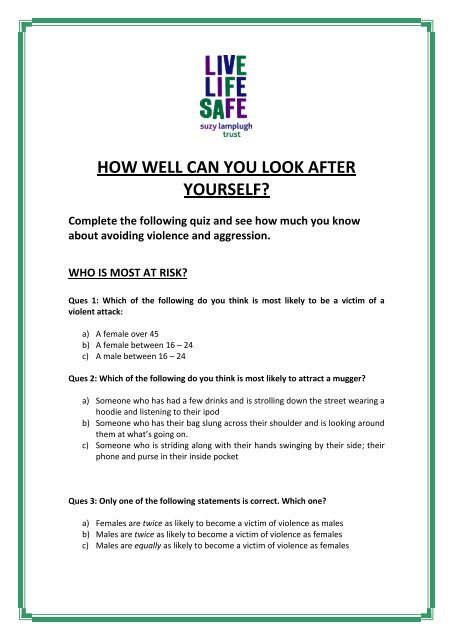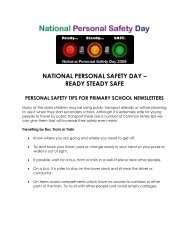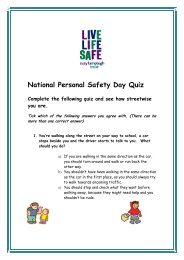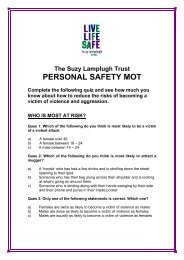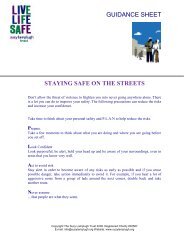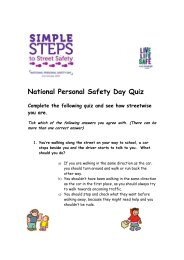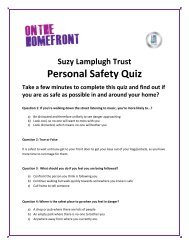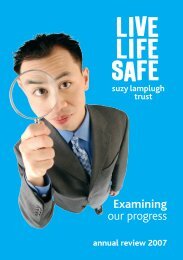Secondary School Quiz - Suzy Lamplugh Trust
Secondary School Quiz - Suzy Lamplugh Trust
Secondary School Quiz - Suzy Lamplugh Trust
Create successful ePaper yourself
Turn your PDF publications into a flip-book with our unique Google optimized e-Paper software.
HOW WELL CAN YOU LOOK AFTER<br />
YOURSELF?<br />
Complete the following quiz and see how much you know<br />
about avoiding violence and aggression.<br />
WHO IS MOST AT RISK?<br />
Ques 1: Which of the following do you think is most likely to be a victim of a<br />
violent attack:<br />
a) A female over 45<br />
b) A female between 16 – 24<br />
c) A male between 16 – 24<br />
Ques 2: Which of the following do you think is most likely to attract a mugger?<br />
a) Someone who has had a few drinks and is strolling down the street wearing a<br />
hoodie and listening to their ipod<br />
b) Someone who has their bag slung across their shoulder and is looking around<br />
them at what’s going on.<br />
c) Someone who is striding along with their hands swinging by their side; their<br />
phone and purse in their inside pocket<br />
Ques 3: Only one of the following statements is correct. Which one?<br />
a) Females are twice as likely to become a victim of violence as males<br />
b) Males are twice as likely to become a victim of violence as females<br />
c) Males are equally as likely to become a victim of violence as females
Ques 4: Which of the following statements is NOT true?<br />
a) 40 – 65 year olds are most at risk of violent crime<br />
b) 23% of victims of violent crime were under 24.<br />
c) Only 2% of victims of violent crime were over 65.<br />
Do You Know How to Reduce the Risks?<br />
ON THE STREETS<br />
Ques 5: You’ve been out with your mates, it’s late and you’re on you’re way home<br />
alone. Should you..?<br />
a) Take any shortcuts because the quicker you get home the better.<br />
b) Take the quietest route because it is safer when there is no-one<br />
around to cause trouble.<br />
c) Take the busiest route because you are safer with more people around.<br />
Ques 6: If you’re walking down the street listening to music, you’re more likely<br />
to…?<br />
a) Be distracted and therefore unlikely to see danger approaching<br />
b) Look cool, so no-one will want to mess with you<br />
c) Look distracted, which means no-one will bother you<br />
Ques 7: Before you go anywhere, you should think about how you are going to get<br />
there and back. Planning your route is good because..?<br />
a) You can think about any safe places to go if you felt threatened e.g. a friends<br />
house, or busy place such as a shop or garage<br />
b) You can avoid getting lost in a strange area<br />
c) Both of the above<br />
Ques 8. If you feel something is ‘not quite right’ about a situation you are in, you<br />
should?<br />
a) Get away from the situation immediately - even if you’re not sure if you’re<br />
in danger.<br />
b) Wait and see what happens – you could make the situation worse by<br />
overreacting.<br />
c) Ignore it; it’s probably just you being paranoid.
Ques 9. If someone starts to get aggressive with you, it’s best to:<br />
a) Hit out first, before they get a chance to.<br />
b) Run<br />
c) Stay calm; speak slowly and clearly and try to talk your way out of it.<br />
Ques 10. What should a personal alarm be used for?<br />
a) To attract attention<br />
b) To calm an attacker down<br />
c) To shock an attacker, giving you time to get away.<br />
Ques 11. If you’re being threatened or are in danger and need assistance, the best<br />
thing to shout is…?<br />
a) Help!<br />
b) Fire!<br />
c) Call the Police!<br />
TRANSPORT<br />
Ques 12. The best place to wait for your bus / train / lift is..?<br />
a) In a well-lit area, near other people.<br />
b) In a darkened doorway, where no-one can see you and therefore bother you<br />
c) In a quiet spot away from everyone else, as you are safer on your own.<br />
Ques 13. On an empty bus you should try to sit..?<br />
a) At the back, away from any trouble getting on the bus.<br />
b) At the front, near the driver.<br />
c) Near the exit.<br />
Ques 14. When travelling on a train, you should…?<br />
a) Look for any empty carriage to sit in. You’re safer on your own<br />
b) Look for a busy carriage to sit in.<br />
c) Avoid crowds but look for a carriage with just one responsible<br />
looking adult in it<br />
Ques 15. When you’re travelling, it’s a good idea to ..?
a) Take extra money in case you have any problems and need to take another<br />
bus/train or taxi.<br />
b) Take your ipod or mp3 player so that you can listen to them and look<br />
occupied.<br />
c) Carry a knife so that you can defend yourself if there is any trouble.<br />
Ques 16. You are on a train and someone who makes you feel a bit uneasy sits next<br />
to you. You should..?<br />
a) Look out of the window to avoid eye contact and stay quiet.<br />
b) Move to another seat or carriage.<br />
c) Take out your phone or ipod and ignore the person.<br />
Ques 17: You are on a bus and someone gets on and starts to shout and make<br />
trouble. They single you out and shout at you to get off the bus with them or else.<br />
You should..?<br />
a) Stay quiet and do what they tell you.<br />
b) Sound the emergency alarm and make as much noise as possible to<br />
attract the driver’s attention.<br />
c) Shout back at them and tell them to get lost.<br />
MOBILE PHONES<br />
Ques 18: Which of the following is NOT true?<br />
a) In half of all street robberies, a mobile phone is stolen.<br />
b) In 10% of crimes where mobile phones are stolen during street<br />
robberies, the phone is the only thing taken.<br />
c) 14 – 17 year olds are the age group most at risk of street crime.<br />
Ques 19: True of False:<br />
If you are walking home alone at night, it’s a good idea to use your mobile to chat to<br />
someone at home until you get there, so that you feel more comfortable and they<br />
know you are safe.<br />
Ques 20: True of False<br />
It’s not a good idea to text a friend while walking along the street.<br />
Ques 21: Where should you keep your phone out of sight?
a) At school<br />
b) On the street<br />
c) In shopping centres and on the High Street<br />
d) All of the above<br />
Ques 22: You receive a threat via text from a number you don’t know. What<br />
should you do?<br />
a) Tell someone you trust - a parent or teacher<br />
b) Ignore the text and delete it<br />
c) Text them back and be equally abusive to show that you are not intimidated<br />
Ques 23: Someone at school asks for your friend’s mobile number so that they can<br />
call them direct. Should you?<br />
a) Say you have an agreement not to give out each other’s numbers but that<br />
you’ll happily give your friend their number and ask them to call.<br />
b) Give them the number; what harm can it do<br />
c) Ring your friend and ask them if it is ok to give out their number<br />
THE INTERNET<br />
Ques 24: A national survey was carried amongst 11 to 17 year olds in the US to find<br />
out how many young people were receiving unwanted sexual approaches while<br />
using the internet? What figure did the survey show?<br />
a) 1 in 5 had received an approach<br />
b) 1 in 25 had received an approach<br />
c) 1 in 50 had received an approach<br />
Ques 25: True or False<br />
Skilled young people who familiarise themselves with the internet are less likely to<br />
encounter online risks?<br />
Ques 26: Which of the following pieces of advice should you ignore?<br />
a) Make sure you don’t give out any personal information (including your age,<br />
school, where you live etc.)
) Stay in control when you are in chat rooms – if something bothers or upsets<br />
you, talk to the person you are chatting to and ask them to stop that line of<br />
conversation.<br />
c) If you really want to meet someone from the net, take someone with you and<br />
tell your parent or carer.<br />
Ques 27: Someone you’ve been chatting to online asks you for your mobile number<br />
so they can text you. Should you?<br />
a) Give it to them because it can’t be traced to your address so you are perfectly<br />
safe doing so.<br />
b) Ask for their number and tell them that you’ll text them instead.<br />
c) Tell them No and that it is nothing personal but you just never give out your<br />
number to people you have only met online.<br />
Ques 28: Someone in a chat room starts to say rude stuff that makes you feel<br />
uneasy. Should you<br />
a) Get out of the chat room immediately and report it to someone.<br />
b) Stay chatting so you can get as much info as possible from them to give to<br />
your parents/police.<br />
c) Get your mates involved so that you feel safer and more confident in dealing<br />
with it.<br />
Dealing with Aggressive Behaviour<br />
Ques 29. You get into an argument with someone in the playground and the other<br />
person is starting to get aggressive. To stop the situation getting violent you<br />
should…?<br />
a) Stay calm; speak gently, slowly and clearly and acknowledge the other<br />
person’s feelings<br />
b) Enforce your authority by standing squarely in front of them and putting your<br />
hands on your hips.<br />
c) Intimidate them by talking loudly and invading their personal space in order<br />
to make them back down.<br />
Ques 30. What should you avoid doing in a potentially aggressive situation?<br />
a) Stay more than two arms lengths from the other person<br />
b) Put your hand on someone to try and calm them down<br />
c) Ask open questions ie. questions that can’t be answered yes or no
Ques 31: When communicating with someone, what % of the message do you<br />
think is communicated by the actual words you use, as opposed to your body<br />
language and tone of voice?<br />
a) 7%<br />
b) 38%<br />
c) 55%<br />
Ques 32: Which of the following methods of communicating would an observer<br />
spot aggression in first?<br />
a) words<br />
b) body language<br />
c) tone of voice<br />
Ques 33: Understanding about personal space is important because?<br />
a) If you stand too far away from someone they will think you are not being<br />
friendly.<br />
b) If you stand too close to someone, they we will feel threatened and may get<br />
aggressive.<br />
c) If someone starts to get aggressive towards you, you can edge closer into<br />
their space and this will intimidate them and they will calm down.<br />
ANSWERS<br />
Question 1.<br />
a = 0; b = 0; c = 3 points<br />
Statistics show that 16 – 24 year old males are the most at risk group in society<br />
Question 2<br />
a = 3; b = 0; c = 0<br />
People who have been drinking make easy targets for thieves, as do those who are<br />
distracted from what’s going on by listening to music. Also, if you are wearing a hood<br />
or earphones you can’t hear anyone approaching from behind.
Question 3<br />
a = 0; b = 3; c = 0<br />
Statistics show that males are twice as likely to suffer from violence and aggression<br />
as females.<br />
Question 4<br />
a = 3; b = 0; c = 0<br />
Statistics show that 16 – 24 year olds are most at risk of violent crime<br />
Question 5<br />
a = 0; b = 0; c = 3<br />
Always try to stick to busy, well-lit roads, even if that means a longer walk. Avoid<br />
short cuts through parks, waste grounds or along dark, deserted streets whenever<br />
possible.<br />
Question 6<br />
a = 3; b = 0; c = 0<br />
Thieves target people who are not paying attention because they are unlikely to see<br />
trouble approaching. You might look cool to some people but you will also look like a<br />
perfect victim to a thief.<br />
Question 7<br />
a = 2; b = 2; c = 3<br />
The more you know about how to get where you are going to and about the route<br />
itself the better. You will appear more confident and purposeful; and will have<br />
sufficient knowledge of places to head for if you think you are in danger.<br />
Question 8<br />
a = 3; b = 0; c = 0<br />
Your instincts are there to warn you. If something doesn’t feel right, trust your<br />
instincts and leave the situation immediately. You are not being paranoid and if you<br />
wait to see what develops you might leave it too late and not be able to leave.<br />
Question 9<br />
a = 0; b = 0; c = 3<br />
Either hitting out first or running are likely to cause the aggression to escalate. By<br />
staying calm and trying to talk your way out of it, you might be able to defuse the<br />
situation<br />
Question 10<br />
a = 1; b = 0; c = 3<br />
A good alarm should be loud enough to shock and disorientate an attacker giving you<br />
time to get away. Although an alarm can on occasions attract attention, that is not
primarily what they should be used for, as most people are so accustomed to hearing<br />
car alarms going off that they tend to ignore the noise. Also, there may be nobody<br />
around to hear it!<br />
Question 11<br />
a = 0; b = 0 c = 3<br />
When shouting for help, try to give specific instruction to anyone that will hear you,<br />
like ‘call the police’, people are more likely to respond to specific commands and to<br />
take it seriously.<br />
Question 12<br />
a = 3; b = 0; c = 0<br />
The old saying ‘safety in numbers’ is true. Always try to stand/travel/walk home<br />
where there are lots of other people as you are much more vulnerable when you are<br />
on your own.<br />
Question 13<br />
a = 0; b = 3; c = 0<br />
If the bus is empty then sit near the driver, so that help is nearby if you need it.<br />
Question 14<br />
a = 0; b = 3; c = 0<br />
If you are on your own, try and get a seat in a busy carriage. An empty carriage may<br />
not stay empty when you get to the next station and you could end up in the<br />
carriage alone with a stranger. Never trust someone automatically just because they<br />
look ‘nice’ or ‘respectable’.<br />
Question 15<br />
a = 3; b = 0; c = 0<br />
It’s always useful to have extra cash on you so that you never get stranded with no<br />
way to get home, apart from walking the streets. Wearing an ipod or mp3 player<br />
when travelling is not a great idea because it could distract you from your<br />
surroundings and you may not notice any possible trouble/danger approaching.<br />
Never carry a knife for protection as it could easily be turned on you.<br />
NB Note on point C – LEGALLY you are not allowed to carry anything to defend<br />
yourself except a personal alarm. Anything that you carry intending to use as a<br />
weapon is illegal, including pepper sprays.<br />
Question 16<br />
a = 0; b = 3; c = 0<br />
<strong>Trust</strong> your instincts. If you are uncomfortable about someone, then move away from<br />
them and towards other people.
Question 17<br />
a = 0; b = 3; c = 0<br />
You will be safer staying on the bus and attracting as much attention as possible. But<br />
avoid answering aggression with aggression, as this will only make the situation<br />
worse!<br />
Question 18<br />
a = 0; b = 3; c = 0<br />
It is not just 10% of the time that ONLY the mobile phone is stolen, it is actually 65%.<br />
Question 19<br />
FALSE = 3 True = 0<br />
It is not a good idea to chat on the phone when walking home alone. Although it may<br />
be comforting, it does not make you safer. If you were attacked then the person at<br />
the other end of the phone could do nothing to help you – and in fact it can make<br />
you less safe. Chatting on your mobile will only distract you from your surroundings<br />
and make you less likely to see or hear danger approaching and therefore make you<br />
less able to avoid it.<br />
Question 20<br />
TRUE = 3 False = 0<br />
Texting a friend whilst walking down the street will distract you from your<br />
surroundings. If you need to send a text, stop at a safe place, such as a garage, shop<br />
etc. to do it.<br />
Question 21<br />
a = 0; b = 0; c = 0; d = 3<br />
Mobile phone thieves are everywhere. Avoid flashing your phone around anywhere<br />
in public<br />
Question 22<br />
a = 3; b = 2; c = 0<br />
Tell a trusted adult about it and they will advise you on what you should do, based<br />
on the content of the text. If you can’t do this for some reason, then delete it<br />
immediately. Do not, whatever you do, get into a ‘conversation’ with the person who<br />
sent the text.<br />
Question 23<br />
a = 3; b = 0; c = 0<br />
You shouldn’t give out people’s numbers without asking. Abusive texts are becoming<br />
more common and your friend may have a good reason for not wanting this person<br />
to have their number. By saying you have an agreement, you can prevent any<br />
apparent rudeness or awkwardness in refusing the request. Calling your friend in<br />
front of the person could cause problems because if they were determined to get
your friend’s number then the obvious thing would be for them to snatch your<br />
phone to get it.<br />
Question 24<br />
a = 3; b = 0; c = 0<br />
The survey found that approximately one in five (about 20%) received a sexual<br />
solicitation or approach over the internet.<br />
Question 25<br />
FALSE = 3 True = 0<br />
The London <strong>School</strong> of Economics and Political Science say that children and young<br />
people who are more skilled at using the internet take up more online opportunities<br />
than beginners - such as using the internet for learning, communicating with friends<br />
or seeking advice. It is skilled young people, more than the beginners, who are likely<br />
to encounter online risks such as bullying or online pornography.<br />
Question 26<br />
a = 0; b = 3; c = 0<br />
If you are chatting and something upsets you or makes you feel uncomfortable, stop<br />
chatting immediately. Don’t reply, even if it is to complain; otherwise you might get<br />
dragged into a conversation you don’t want to have.<br />
Question 27<br />
a = 0; b = 0; c = 3<br />
It’s safest just to say NO. Someone can become a real pest by sending unwanted or<br />
abusive texts or phone calls.<br />
Question 28<br />
a = 3; b = 0; c = 0<br />
Get out immediately and report it to an adult/directly to the police. Don’t try and do<br />
the police’s job for them – your job is to keep yourself safe. Likewise, it is not safe to<br />
get friends involved.<br />
Question 39<br />
a = 3; b = 0; c = 0<br />
If you stand squarely in front of someone with hands on hips, your body language is<br />
not being authoritarian it is being clearly aggressive and would be likely to escalate<br />
any aggressive situation. Talking loudly and invading a person’s personal space are<br />
also aggressive signals and would have the same negative effect.<br />
Question 30<br />
A = 0; b = 3; c = 0<br />
You should avoid any physical contact with someone who is angry or upset, as this is<br />
likely to make them worse. You should respect people’s personal space by staying<br />
more than two arm lengths away from them. Getting them involved in a<br />
conversation is a useful tool for calming someone down.
Ques 31:<br />
a = 3; b = 0; c = 0<br />
You communicate in three ways: Body language (55% of communication), tone of<br />
voice (38% of communication) and words (only 7% of communication).<br />
Ques 32:<br />
a = 0; b = 3; c = 0<br />
Aggressive body language is the first sign that someone is feeling upset or angry. In a<br />
potentially volatile situation, watch out for signs from the other person and try to<br />
keep yourself from sending out the wrong messages<br />
Ques 33:<br />
a = 0; b = 3; c = 0<br />
People feel threatened if they are crowded. Keep back or you may come across as<br />
aggressive. It also means that you are out of their reach if they take a swing at you.<br />
Scores<br />
Now add up your points and see how you’ve done.<br />
If you score between 66 – 99<br />
Congratulations! You know what you are doing and how to keep safe. Just make sure<br />
that you always put into practice what you know. A lot of people make the mistake<br />
of knowing all the safety precautions they should take but just not bothering to take<br />
them. You know what to do so you’ve got no excuses!<br />
If you score between 34 – 65<br />
You’re reasonably safe out and about but you do need to pay a bit more attention<br />
and realise that keeping yourself safe is not about being treated like a child – the<br />
same safety precautions apply to adults!
If you score between 0 – 33<br />
Ooops! You really do need to learn a bit more about personal safety. Read the quiz<br />
and the answers again and talk it through with your mates, a teacher or your<br />
parents.


